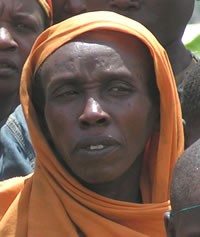Pygmy, Twa in Rwanda

Photo Source:
Mark Maynard
|
Send Joshua Project a map of this people group.
|
| People Name: | Pygmy, Twa |
| Country: | Rwanda |
| 10/40 Window: | No |
| Population: | 33,000 |
| World Population: | 133,000 |
| Primary Language: | Kinyarwanda |
| Primary Religion: | Ethnic Religions |
| Christian Adherents: | 9.00 % |
| Evangelicals: | 6.00 % |
| Scripture: | Complete Bible |
| Ministry Resources: | Yes |
| Jesus Film: | Yes |
| Audio Recordings: | Yes |
| People Cluster: | Pygmy |
| Affinity Bloc: | Sub-Saharan Peoples |
| Progress Level: |
|
Introduction / History
Members of the tribe make pots which they take to the market to sell, but they say there is a very big gap between the burden of making them and the very little money they get. The clay is hard to find because the swamps where the clay comes from is no longer exploited because of the protection of the environment. To get this small quantity of clay, they need to beg the owners of the land because the Batwa themselves do not own the land. Formerly they made their living by hunting and from the fruits of the forest. These activities are no longer done today.
Generally the Batwa in this area have a very hard life, they find inconsistent jobs to do for other people around to get a little money. When this work is not found, they go hungry.
They live in congestion in their small houses. For example, you may find a family of 7 people staying in a single room, children and parents together.
When you get inside their houses, you find neither a bench nor a bed nor a mattress in the bedroom. When the night comes some of them never receive a visitor to spend a night with them. This is not because they do not wish to receive visitors, but because if a visitor comes, there is no place for them to stay.
Those who do own a locally made bed will scatter grass on it to lay down in place of mattress which they cannot afford to buy for themselves.
They are receptive people. They marry at a young age as teens after they leave school.
Their children attend primary schools but they never go far in their education because of the extreme poverty that does not allow them to pay school fees for their children. Children leave school very early to engage in small jobs in the neighborhood and in markets to earn a living. Batwa children are harassed and insulted in the schools by teachers and fellow students.
Because of the political and economic change, the Batwa culture is threatened. Pressure is everywhere, and the Batwa seem to have forsaken their traditional dances, concerts and other cultural facts to the survival means of every day.
Prayer Points
Children of the Batwa need regular finances to keep them in school.
The youth of the Batwa need to learn some training skills to help them to regularly earn a living, such as sewing, carpentry or metallurgy.
The Batwa people have no medical facilities, not even water.
In their lives, most them dream of sleeping on mattresses and some don't have clothes.
The Batwa people are unchurched and desire to have their own church.
Half the Batwa do not know to write and to read the local language.